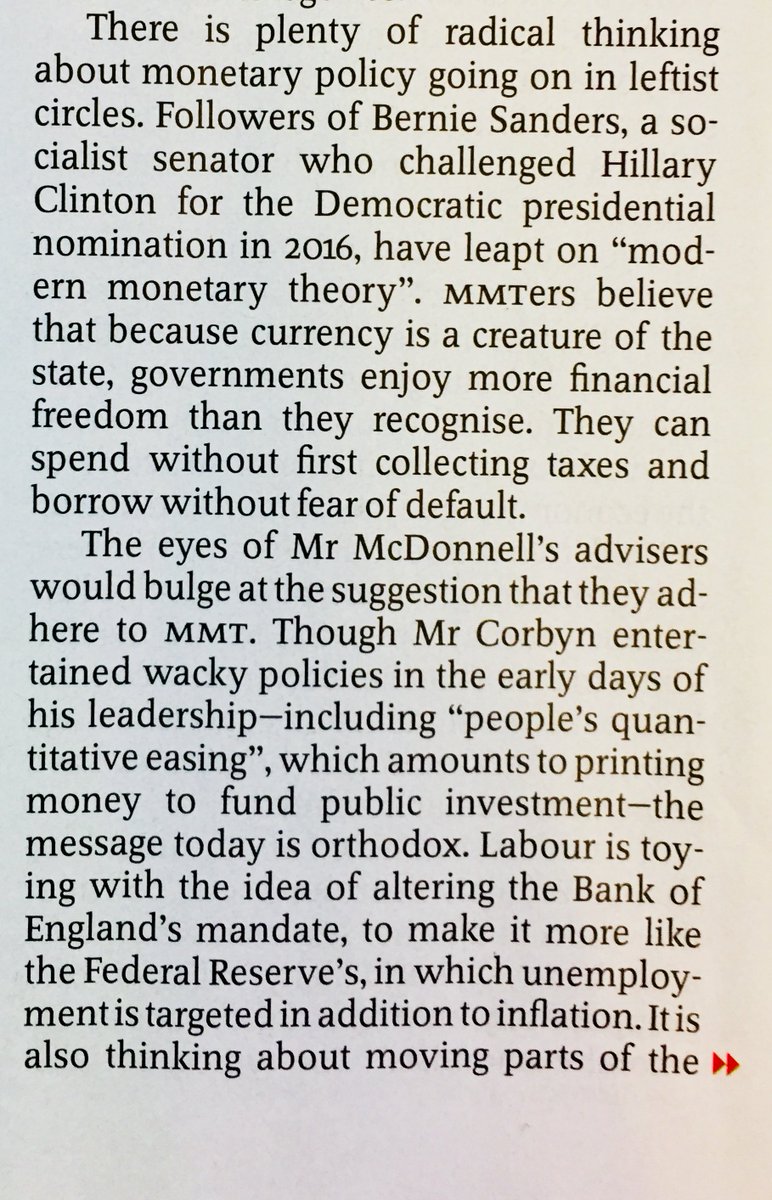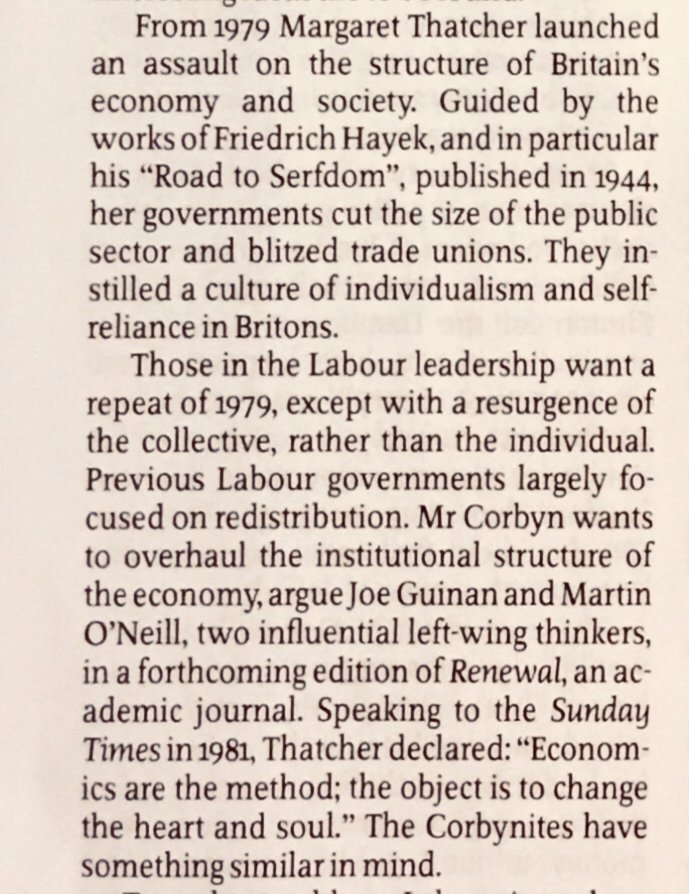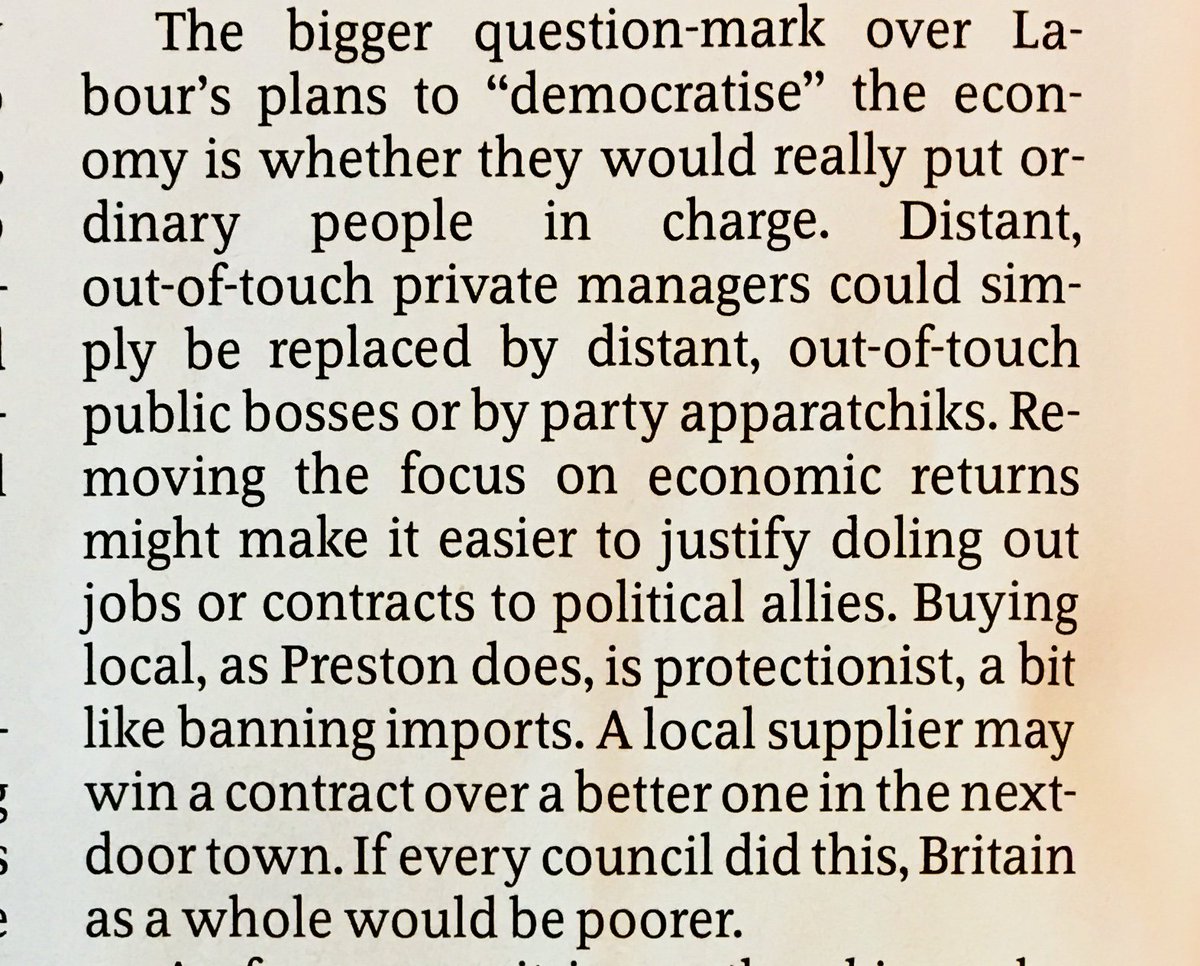On the newly-renationalized (✊😊💯👍!) East Coast rail, heading home to York after a very stimulating day at the @UKLabour #StateOfTheEconomy conference, it seemed like a good moment to reflect on this week's @TheEconomist piece on 'Corbynomics' (THREAD)
economist.com/britain/2018/0…
economist.com/britain/2018/0…
The first thing to say is that @duncanrobinson & @econcallum are to be congratulated on a serious piece of analysis, which avoids the parade of dismal, lazy clichés that we see in so many other publications. Serious political journalism shouldn't be so rare, but it's good to see!
There's a useful analytic frame in dividing Labour's political economy thinking into fiscal policy, monetary policy, and structural reforms. And it's right to say that the third of these will actually be the most significant.
The Economist may be right that this fact has been missed by most commentators, but if so that's odd, as this emphasis on structural reform was also there in @Ed_Miliband's ideas around 'predistribution'. So it's not all new.
(On #predistribution, see: policy-network.net/pno_detail.asp… )
(On #predistribution, see: policy-network.net/pno_detail.asp… )
It's right to say that 'People's QE'/ MMT has dropped out of Labour's thinking, and that Labour's fiscal proposals are now being advanced within a completely orthodox monetary framework. The justifications for this self-imposed constraint may be as much political as economic.
This also presents an interesting contrast with the retreat from orthodox monetary policy that one sees from figures like @AdairTurnerUK @INETeconomics, a former @TheFCA head and @CBItweets director general, who now advocates direct monetary finance:
Labour now doesn't have a dog in this fight, but @TheEconomist hits a duff note in describing 'People's QE' as a "wacky policy", at least in the absence of an explanation of why *actually existing* QE, of which the @bankofengland has done £445bn since 2009, was any less wacky. 

If a future Labour government does alter the @bankofengland MPC mandate explicitly to take into account employment levels, that would merely bring it closer into line with the US Fed, and bring a closer alignment of the theory and practice of monetary policy in action.
An expanded mandate could also introduce a concern with restricting effects on #inequality of any future open market operations. It's a contested area, but had such a duty been in place, that may have altered the policies adopted since 2009. See, e.g. theguardian.com/business/2012/…
Needless to say, I liked these two paragraphs a great deal, and think that the analogy with Hayek and Thatcher is spot-on. The political Right has long understood the role of economic institutions that create the political conditions for their own support, and the Left must too. 

And it was an unexpected treat to see the shout-out for the work that @RENEWALjournal has been doing, outlining the developing strands of Labour's thinking on political economy, and what we call the "institutional turn" in Labour and left thinking on political economy.
The piece by @joecguinan & me that @duncanrobinson mentions, on "The Institutional Turn: Labour's new political economy", will be in the next issue of @RENEWALjournal, w/ discussion of Piketty, economic democracy, Cole, Dahl, Mondragón, Attlee & much else
External Tweet loading...
If nothing shows, it may have been deleted
by @duncanrobinson view original on Twitter
Subscription rates for @renewaljournal are *amazingly* reasonable, and your next issue is just a click or two away. :-) renewal.org.uk/subscribe/
On the substance, @TheEconomist piece is right to identify Karl Polanyi's The Great Transformation as one key text (among others) standing behind this approach, as it was also for Labour under @Ed_Miliband. On Polanyi, see @joecguinan & @ThomasMHanna here: renewal.org.uk/articles/polan…
At the same time, I think it would be a mistake to elevate Polanyi's book to a unique place of primacy in the justification of "the institutional turn" (or turn towards structural transformation) in Labour's economic thinking. There's a broad renaissance of serious thinking ...
... that includes revisiting various strands of left political economy, from going back to elements of Marx and Gramsci, to looking again at Tawney, Cole, Keynes, Dahl, Meade, Michael Young, Rawls, & Stuart Holland, up to important recent work from Piketty, Mazzucato, Pettifor &c
Also, it seems to me a false dichotomy to contrast, as the article does, an egalitarian critique of capitalism for producing poverty & inequality, as against a 'moral economy' critique that focusses on "spiritual and moral decline". For social egalitarians, from Tawney onwards ..
.. to Crosland, Rawls, T. M. Scanlon, Elizabeth Anderson, Samuel Scheffler, & Iris Marion Young, it's not that one care's *either* about inequality or social relations, but that there is an internal relationship between the two concerns. More on this here: bostonreview.net/books-ideas/ma…
Or, for the much longer version, here, in my "What Should Egalitarians Believe?", Philosophy & Public Affairs, (2008).
academia.edu/3842807/_What_…
academia.edu/3842807/_What_…
And, on a related set of issues, here's a case for why James Meade is such an interesting figure in this tradition that links a 'structural' or 'institutional' approach to egalitarian public policy to a social egalitarian outlook @policynetwork :
policy-network.net/pno_detail.asp…
policy-network.net/pno_detail.asp…
... and here's how the critique of #inequality in Piketty should lead us to policies that are more structural and institutional, and not so much on the lines of the "merely redistributive" fiscal proposals foregrounded in initial responses to Piketty:
onlinelibrary.wiley.com/doi/abs/10.111…
onlinelibrary.wiley.com/doi/abs/10.111…
Anyway, my train is past Doncaster, and so I'd better wind this up! Moving on to the critical part of @TheEconomist piece, I think the "protectionism" critique of the #PrestonModel of Community Wealth Building misses its target. #CommunityWealthBuilding isn't about local borders. 

Rather, the #PrestonModel of #CommunityWealthBuilding, pursued by @MatthewBrownLab & his colleagues, and the @DemocracyCollab in the US, is about finding non-extractive models of economic development, and prioritising the interests of labour over capital.
renewal.org.uk/articles/the-r…
renewal.org.uk/articles/the-r…
What I think of as the "economists' objection" to #CommunityWealth policies (or perhaps @TheEconomist's objection) is one thing that I discuss in a forthcoming interview with Ted Howard of @DemocracyCollab, also in the next @RENEWALjournal. It's important to engage with & reject.
Right... that's kept me occupied back home to York. I'll finish by saying that I agree 💯 with my @renewaljournal colleague @j_stafford88. So again, hats off to @duncanrobinson and @econcallum for raising the level of media discussion.
External Tweet loading...
If nothing shows, it may have been deleted
by @j_stafford88 view original on Twitter
Nearly forgot...!
@threadreaderapp unroll please
@threadreaderapp unroll please
• • •
Missing some Tweet in this thread? You can try to
force a refresh




